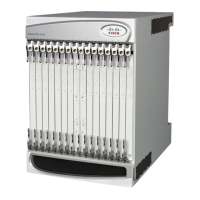Session Control Manager Overview
▄ Cisco ASR 5000 Series Product Overview
Route Lists
Route lists are service level lists that assist in finding the next CSCF/UA hop. These are static routes and will override
any dynamic routes (based on DNS queries for FQDNs).
Signaling Compression
The Session Initiation Protocol (SIP) is a text-based protocol designed for higher bandwidth networks. As such, it is
inherently less suited for lower bandwidth environments such as wireless networks. If a wireless handset uses SIP to set
up a call, the setup time is significantly increased due to the high overhead of text-based signaling messages.
Signaling Compression (SigComp) is a solution for compressing/decompressing messages generated by application
protocols such as SIP. The P-CSCF component of the SCM uses SigComp to reduce call setup times on the access
network, typically between the P-CSCF and the UE. The following features are supported:
SigComp Detection - P-CSCF detects if the UE supports SigComp and compresses messages it sends to the UE.
The P-CSCF also detects if messages it receives are compressed and decompresses them.
SigComp Parameter Configuration - P-CSCF allows the configuration of Decompression Memory Size
(DMS), State Memory Size (SMS), and Cycles Per Bit (CPB).
Failure Acknowledgement - P-CSCF replies with NACK on decompression failure.
SIP/SDP Static Dictionaries - P-CSCF supports the Session Initiation Protocol/Session Description Protocol
Static Dictionary for Signaling Compression.

